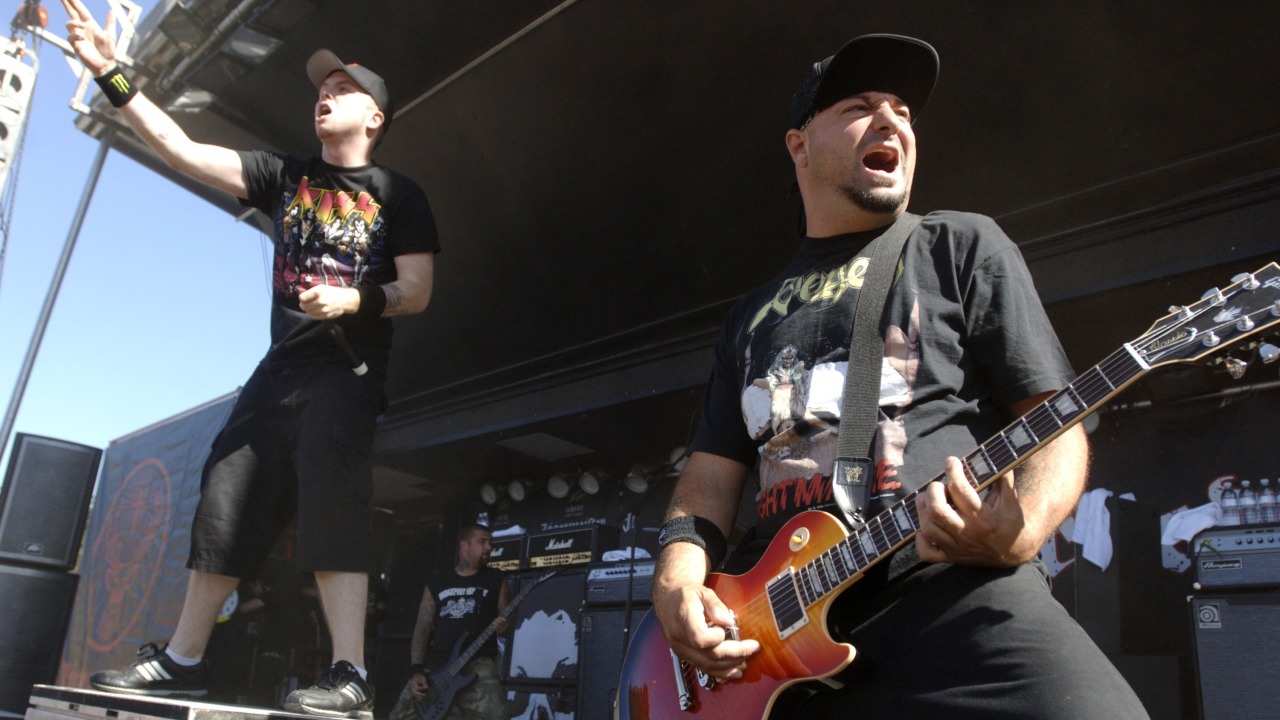The sound of Jamey Jasta’s speaking voice isn’t unlike what you’d expect if you sprinkled broken glass on gravel and scraped your boots over the top. It’ll pop back into fullness for moments at a time, and – briefly – carry a kind of sweetness and reserved calm that would do little to suggest this man fronts the biggest hardcore band the world has ever seen.
It betrays his humble New Haven, Connecticut roots and the down-home friendliness associated with the USA’s New England states. But it’s never long before he
lapses back into that scratchy, almost inaudible whisper that can make a conversation with him a painfully awkward affair if you’re slightly hard of hearing. Surely, it can’t always sound like that. Overdo it last night?
“Nah, not at all,” he scratches. “10 years of doing this will do that to you.”
It’s morning, and right now he’s enjoying a rare span of time to sit down and gather his thoughts. In a few hours he’ll be playing to thousands of devoted and soon-to-be-converted Hatebreed fans from the pulpit of Ozzfest’s main stage.
The momentousness of Hatebreed’s ascent to the lofty heights of America’s biggest metal festival isn’t lost on the softly-spoken frontman. He sounds more like a kid
who’s just got his first break in music than a household name synonymous with hardcore. Of course, the sheer volume of interviews with him that populate the net mean that much of what he says comes across itself like a press release. It’s only the fault of repetition.
“It’s been so awesome doing this,” he says, beaming. “It’s such a big thing for us, and every day it’s just going out there and seeing thousands of people going nuts. Sometimes I think there are certain places where people had forgotten about us, so I was happy when we started getting out there again and I realised they didn’t. To have such a warm welcome meant a lot to me. It’s really empowering.”
If it sounds like Jasta’s experienced some insecurity about the loyalty of his fan base then it’s with good reason. After 10 years of clawing his way out of the New England hardcore scene to become America’s first Grammy-nominated hardcore band (for 2003’s Rise Of Brutality), even he sees the danger in too much of a good thing, because – as he concedes – swelling success is more of a burden when your credibility is staked on an aversion to materialism and the mainstream. It’s a compromise, sure, but one that Jasta’s willing to make if it helps the scene.
“That was such a high for me, because by the success of that album I knew that I was really connecting with a lot of people, that people were connecting with us. That made doing a new record even harder, because we knew we had to outdo that.”
“That was such a high for me, because by the success of that album I knew that I was really connecting with a lot of people, that people were connecting with us. That made doing a new record even harder, because we knew we had to outdo that.”
What he’s referring to is Supremacy, Hatebreed’s sixth album and something that Jasta seems to see as a kind of rebirth for a band all too vulnerable to producing what many might see as, whisper it, just another Hatebreed record.
“Of course this had to be the kind of album where the moment you put it in the CD player you know it’s us, so we made it crushing,” he chuckles. “What you have to realise is there’s new things in there, new tempos, it’s a progression for us because it all really represented a new life for us. We’re Hatebreed, so we have to keep our identity intact.
“I was happy that we were able to keep that DIY spirit, where everyone working on the album was our friend, that even though we’re still on this big label over here we’re still able to keep that feeling in the studio. It’s about finding new ways to stay connected.”
Identity is a big issue for Jamey Jasta. The founder of a band that, in 1994, was as underground as they come and spawned from a scene that prides itself as much on its DIY ethos as it does an allergic reaction to commercial interests, he’s acutely aware that his band’s success is inevitably going to lead to accusations of having sold out. But as he looks at it, cultivating mainstream appeal can only have collateral benefits.
“The way I see it is we’re helping to give other bands like us opportunities, and that helps us because it keeps people interested in the music,” he says flatly. “Look at Full Blown Chaos, who are on our label (Stillborn Records), and they’re out on Ozzfest with us. It’s great to see bands like that because they’re doing their thing, they’re having fun, but they’re helping the scene thrive. That’s why we’re all doing this.”
Of course, you could look beyond Jasta’s words and consider that last November Hatebreed held a 10 year anniversary show at Toad’s Place, a local New Haven venue that was once Jasta’s portal into the world of heavy music. The poetry of returning there to celebrate his band’s triumphant longevity isn’t lost on the ever-more hoarse singer.
“We’re playing to people from all walks of life now, but that’s our roots right there,” he says, sounding reverential. “I saw the Vaselines there, Carcass, Napalm Death, Sick Of it All… it was amazing. I can’t even remember the first show I saw, they were local. I was like 13 and there were all these scary kids waiting in line outside and I just thought, ‘Wow’. ”
As Jasta tells it, it would be Toad’s Place where he’d first meet the older kids who would share more than the music but the ethos and spirit that drives the hardcore scene and gives it its fraternal sense of community.
“The irony was that when we started we couldn’t get booked there because we had this reputation for violent shows,” he laughs. “They wouldn’t let us in.”
That they returned not only to play their 2002 album Perseverance in its entirety, but that hardcore legends All Out War reformed merely to play that event is no small source of pride for Jasta. To him, it’s those gestures of community that make it all worthwhile.
“We came up with those guys in a way,” he says. “We did a lot of shows together very early on. It was just one of those things where I called home and they were completely into the idea.That meant a lot to me. It was so great to get everybody out of the woodwork. It was just this really nice homecoming – it was electrifying.”
To really understand Jamey Jasta and Hatebreed’s latest record, and to have a grasp of just how badly he needed a warm welcome home, you need to know something about the events of the last few years, most specifically March 21, 2004. Hatebreed were on the up following the rapturous receipt of Rise Of Brutality the year before, they were touring the globe, and – from the outside at least – things couldn’t have looked brighter. But for the fact that longtime Hatebreed manager and Jasta’s close personal friend Steve Richards had just died following a long battle with brain cancer.
It couldn’t have been harder on Jasta, who soon succumbed to depression and a lack of interest in everything to do with music, his band, and the scene. As he admits – his voice cracking even more – he utterly lost himself.
“Every record we’ve ever done has been a snapshot of where we’ve been at,” he says. “For Supremacy I felt like I needed to lose control and regain power over myself, because for a couple of years there it was like everything just got out of control. It’s been a real journey for me.”
He won’t go into detail about how bad things got for him, declining and then stopping altogether when pressed into detail. A moment passes, then two, and then he continues – still relenting as though being forced into confession.
“I want people to read through the booklet and get that whole experience,” he says, finally. “Without getting too deep or too into the absurd, it was just one of those things where I felt there were a lot of bad decisions I was making in my life as the result of some very bad circumstances. I became a very angry person, a very negative person. That isn’t me, but it was like everything that was just slightly bad in my life snowballed out of control.
“I’m just hoping that people can get some insight from what I’ve written,” he says, earnestly. “It would have helped me.”
Judging from the entries on Supremacy – stomping odes with flagellating names like Defeatist, Horrors Of Self and Spitting Venom – it’s easy to get the sense of an artist and, let’s face it, entertainer who’s made a career from catharsis via his music.
Cynically speaking you could also get the sense that he’s monetised his loss, found a way to make the everyday experience of life commercial. If it wasn’t for the sincerity in his voice and his obvious dedication to the scene that spawned him, or his undeniable pain at his experience and the confessional core of his music that’s remained a constant from its brash beginnings, you could say all of those things. But you wouldn’t dare.
Hatebreed play the Ronnie James Dio Stage at the Bloodstock Open Air Festival on August 8
* *

